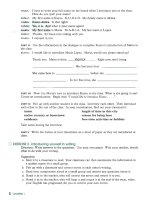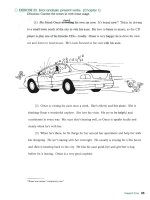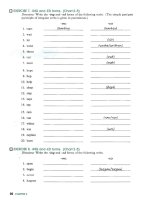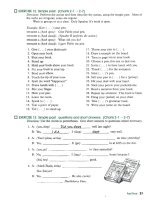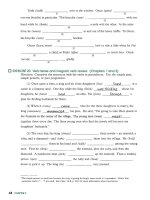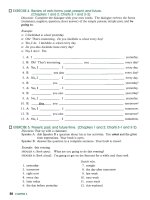Fundamentals of english grammar third edition part 14 doc
Bạn đang xem bản rút gọn của tài liệu. Xem và tải ngay bản đầy đủ của tài liệu tại đây (390.26 KB, 7 trang )
9.
Sometime in the next twenty-five
years, a spaceship with a human
crew
(land)
on Mars. I
(think)
they
&nd)
evidence of some kind of life forms
Someday, however, I
(believe)
that humans
(make)
contact with other intelligent beings in the
universe.
EXERCISE
32.
Review: verb forms. (Chapters
1
+
3)
Directions:
Complete the sentences with a form of the verb in parentheses.
(1)
Three hundred and
fifty
years ago, people
(make)
wde
their own
clothes. They
(haw, not)
machines for making clothes.
There
(be, not)
any clothing factories. People
(wear)
homemade clothes that were sewn by hand.
(2)
Today, very few people
(make)
their own clothes. Clothing
(come)
ready-made from factories. People
(buy)
almost all their clothes from stores.
(3)
The modern clothing industry
(be)
international. As a
result, people from different countries often
(wear)
similar clothes.
For example, people in many different countries throughout the world
(wear)
jeans and T-shirts.
(4)
However, some regional differences in clothing still
(exist)
For instance, people of the Arabian deserts
(wear)
loose, flowing
robes to protect themselves from the heat of the sun. In parts of northern Europe,
fur
hats
(be)
common in the winter.
(5)
In the future, there
(be, probably)
fewer and
fewer differences
in
clothing. People throughout the world
(wear)
clothes from the same factories.
(we
all,
dress)
alike
in the future?
TV
shows and movies about the future often
(show)
everybody in a uniform of some kind. What
(you,
chink)
?
Future
Tlme
79
EXERCISE
33.
Error analysis: summary review of present, past, and future time.
(Chapters
1
+
3)
?,
.
.
Directim:
Correct the errors.
.
,
1.
I
used to kick
&
my sister's legs.
2.
We had a test last week, and
I
past it.
,
3.
1
not like the food in the United State.
4.
I
use to get up at noon, but now
I
have to be at work by eight.
5.
I
study hardly every day, but my english is not be improve.
6.
Everyone enjoy these English classes.
,
\:
7.
At the picnic, we sang songs and talk to each other.
.
.
.:.
,,
-
8.
I
learn the english in my school in hong Kong before
I
come here.
9.
I
lie to travel.
I
gonna go to new and interesting places all my life
,!,,,110.
Now
I
study at this school and
I
living
with
my cousin.
I
am always meet my friends
in the cafeteria and we talking about our classes.
1 1.
When
I
wake up in the morning.
I
am turning on the radio. Before get up.
12.
I
am live
with
an American family. They
are
having four childrens.
13.
When
I
was at the outdoor market.
I
pointed at the chicken
I
wanted to buy. The man
was taking it from a wooden cage and kill it without mercy.
8.
14.
Every day
I
wake up when the buds begin to sing.
If
the weather not to be cloudy,
I
'
75
am
seeing a beautiful sunrise from my bed.
.(
:
.,
1
'
11
-
15.
My husband and children they are
going
to join me
after
I
will finish my English
course.
EXERCISE
34.
Error analysis: summary review of present, past, and future time.
(Chapters
1
+
3)
Direeeions:
Rewrite the paragraphs. Correct any errors in grammar, spelling, or
punctuation. If you wish, change the wording to improve the expression of the ideas.
1.
I
want to tell you about Oscar. He my cousin. He comes here four years ago. Before
he came here, he study statistics in Chile. When he leaves Chile to come here. He
came with four friends.
They
were studying English in Ohio. Then he went to New
york stayed there for three years. He graduated from NewYork University. Now he
study at this school. After he finish his Master's degree, he return to Chile.
2.
Long ago in a faraway place, a lonely man move into a new neighborhood. His first
project is his new garden. He begun to work on it right away. He wanting to make a
perfect garden. One day some friendly neighbors and their children visitted the man
in his garden and helpped him with the work. They planting flowers and build a small
bridge across a little stream.
AU
of them were very happy during they were building
the bridge and work on the garden. The man was especially happy because he's no
longer lonely. While the adults working, some of their children plaied with a ball in the
garden while they were play, one of them step on a flower. Suddenly the man was
getting very angry and tell everyone to leave. All the neighbors leaved and go back to
their own homes. After that, the man builded a wall around his garden and lock the
gate. For the rest of his life, the man sat alone in his gerden every evening and crying.
EXERCISE 35. Review: verb forms. (Chapters
1
+
3)
Ditections:
Complete the sentences with the correct forms of the words in parentheses.
A:
Okay, let's all open our fortune cookies.
B: What
(yours, say)
?
1
A:
Mine says,
"An
unexpected
gift
(add) to your pleasure."
2
Great!
(you,
plan)
to give me a
gift
soon?
3
Future
Time
81
B:
Not that
I
know of. Mine says, "Your trust in a friend
(pe)
4
well-founded." Good.
I
(like)
having trustworthy friends.
5
C: This one says,
"A
smile
(mmcome)
a language
6
barrier." Well, that's good! After this, when
I
(understand,
nor)
7
people who
(speak)
English to me,
I
(smile, just)
8
at them!
9
D: My fortune is this: "Your determination
(make)
YOU
10
succeed
in
everything."
,
,
L.
A:
Well, it
(iook)
like all of us
(have)
11
12
,;
,<I1
[I!
I:
good
luck
in the future!
,':
,"'
'
.
",
""'
.
.
0
EXERCISE
36.
Future time. (Chapter
3)
-
Direcrias:
Do you believe that some people
are
able to predict the future? Pretend that
.
,
you have the abiliry to see into the future. Choose several people you know (classmates,
teachers, family members, friends) and tell them in writing about their future lives.
Discuss such topics as jobs, conmbutions to humankind, marriage, children, fame, and
exciting adventures. With your words, paint interesting and
fun
pictures of their future
lives.
,",-!Perfect and
the
T
Past
Perfect
I
CONTENTS
I
4-1
Past participle
4-6
Present perfect progressive
4-2
Forms of the present perfect
4-7
Present perfect progressive vs. present
4-3
Meanings
of
the present perfect perfect
4-4
Simple past
vs.
present perfect
4-8
Using
already,
yet,
still,
and
anymore
4-5
Using
&me
andfor
4-9
Past perfect
U
EXERCISE
1.
Review and preview: present and past verbs. (Chapters
1,2,
and
4)
Directions:
Complete the sentences with the words in parentheses. Some of the
completions review verb tenses studied in Chapters
1
and
2.
Some of them preview verb
tenses that will be studied in
this
chapter: the present perfect and the past perfect.
Discuss the form and meaning of the new tenses.
There may be more than one possible correct completion.
My name
(be)
IS
Surasuk Jutukanyaprateep.
I
(be)
from
1
2
Thailand. Right now
I
(~tudy)
English at this school.
I
(be)
3
at this school since the beginning of January.
I
(arriw)
4
here January
2,
and my classes
(begin)
5
6
January
6.
Since
I
(come)
here,
I
(do)
7
8
many things, and
I
(meet)
many people. Last week,
I
(go)
9
to a party at my friend's house.
I
(meet)
10 11
some of the other students fromThailand at the party. Of course, we
(speak)
Thai, so
I
(practice,
mt)
my English
12
13
that night. There
(be)
only people from Thailand at the party.
14
.
i'.
:'*
.@?:.
,
,-
.
.
,.
However, since
I
(come)
here,
I
(meet)
,
L",
r::.:
.
IS
16
y:
I
a lot of other people, too.
I
(meet)
people km Latin America,
17
.
~
:
',
-5.
,+
Africa, the Middle East, and Asia.
I
enjoy meeting people from other countries. Before
I
,.?
:,
.
,
2,
,
$%
came here,
I
(meet,
nam)
,
&::
.;
1"
't:
anyone from the Uluaine
p-:
18
.:.+$
or Bolivb&&~:$
(know)
people from both these places, and they
19
(become)
my friends.
20
1
4-1.
PAST PARTICIPLE
SIMPLE
FORM
SIMPIH
The
pest participle
is one of the principal parts
PAST
of
a
verb. (See Chart
2-6,
a
32.)
.
-
REGULAR
finish
The past participle is used
in
the
PR~SENT
VERBS
stop
finished
5nished
PERFECT
tense and the
PAST
PERFECT
tense.*
wait
Stopped
L2z2
The past participle of
regular
verbs is the same as
waited
the sim~le ~ast form: both end
in
-ed.
IRRFGULAR
see saw See chart
i-7,
p.
33,
for a list of irregular verbs.
VBRBS
make made
'The
past partiaple is
also
used
in
rhe
passive.
See Chapter
10.
EXERCISE
2.
Past
partlclple. (Chart
4-1)
Directions:
Write the past participle.
SIMPLE
FORM
1.
finish
2. see
3.
go
4.
have
5.
meet
6.
call
7.
fall
8. do
9.
know
lo.
fly
SIMPLE
PAST
PAST PAKllCIPLE
finished
Fi~ish~A
saw
see*
went
had
met
called
fell
did
knew
flew
SIMPLE
SIMPLE
FORM
PAST
11.
come
12. study
13. stay
14. begin
15.
start
16.
write
17.
eat
18. cut
19. read
20.
be
came
studied
stayed
began
started
wrote
ate
cut
read
wadwere
PAST
PARTICIPLE
(a)
I
hawefinished
my work.
STATEMBNT:
haeelhas
+
pascpadple
@)
The students
hawfinished
Chapter
3.
(c)
Jii
has eaten
lunch.
(d)
I'wl~u've/~'wlThgy've
eaun
lunch.
corncnox
(e)
She'sIHe's
earn
lunch.
pmun
+
hawe
=
'w
(f)
It's
ban
cold for the last three days.
pronoun
+
ha8
=
's*
(g)
I
haw
not
(hawn't))Jinished
my work.
NEQA~:
havelhas
+
not
+
pastpaniciph
(h)
Ann
has
not
(hasn't) eaten
lunch.
NEGATIVE
CONTRACTION
haw
+
not
=
haven't
has
+
not
=
hasn't
-
-
(i)
Haee youfinwhed
your
work?
(j)
Has
Jim
eaton
lunch?
(k) How long
have
YOU
lived
here?
QUESTION:
hmrolh~~
f
su&t
+
put paTti&pb
(I)
A:
Have
you
seen that movie?
B:
Es,
I
haw.
OR
No,
I
hawn't.
(m)
A:
Has
Jim
eaten lunch?
B:
Ya,
he
has.
OR
No,
he
hasn't.
SHORT
ANSWER:
hawlhawn't
or
hadhasn't
Note:The helping verb in the short answer is not
contracted with the pronoun.
INCORRECT:
Ya,
I'm.
OR
Ya,
he's.
I
I
I
*COMPARE:
It's
cold
laday.
[It's
=
It
L:
It
ia
cdd
todw.1
1e.s
been
cold
since
December.
[It3
=
h
has:It
hw
been
cold
rin~
Decmbn.1
0
EXERCISE
3. Forms
of
the present perfect. (Chart
4-2)
Direcriom:
Complete the dialogues with the words
in
parentheses. Use the present perfect.
1.
A:
(you,
eat,
ew)
Have
YOh
evev
P~+PIZ
seaweed?
B:
No,
I
haveh
.
I
(eat, never)
evev
@-+em
seaweed.
I+
2.
A:
(you, stay,
m)
at a
big
hotel?
B:
Yes,
I
.
I
(stay)
at a
big
hotel
lots of times.
3.
A:
fyoy meet, ew)
a movie star?
B:
No,
I
.
I
(meet, never)
a
movie star.
4.
A:
(Tom,
visit,
ew)
you at your house?
B: Yes, he
.
He
(visit)
me lots
of times.
5.
A.
(Ann,
be, ever)
in
Mexico?
B: No, she
.
She
(be, nm)
in
Mexico. She
(be,
not)
in
any
Spanish-speaking
coumies.
The Present Perfect
and
the
Past
Perfect
05


